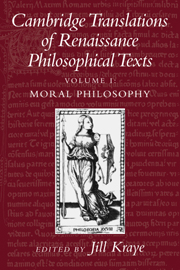Book contents
- Frontmatter
- Contents
- List of Translators
- Preface
- PART I CONCEPTS OF MAN
- PART II ARISTOTELIAN ETHICS AND THE SUPREME GOOD
- PART III ARISTOTELIAN ETHICS AND CHRISTIANITY
- PART IV PLATONIC ETHICS
- 12 Cardinal Bessarion
- 13 Marsilio Ficino
- 14 Francesco Cattani da Diacceto
- 15 Francesco de' Vieri
- PART V STOIC ETHICS
- PART VI EPICUREAN ETHICS
- Bibliography of Renaissance Moral Philosophy Texts Available in English
- Index Nominum
- Index Rerum
14 - Francesco Cattani da Diacceto
Published online by Cambridge University Press: 05 June 2012
- Frontmatter
- Contents
- List of Translators
- Preface
- PART I CONCEPTS OF MAN
- PART II ARISTOTELIAN ETHICS AND THE SUPREME GOOD
- PART III ARISTOTELIAN ETHICS AND CHRISTIANITY
- PART IV PLATONIC ETHICS
- 12 Cardinal Bessarion
- 13 Marsilio Ficino
- 14 Francesco Cattani da Diacceto
- 15 Francesco de' Vieri
- PART V STOIC ETHICS
- PART VI EPICUREAN ETHICS
- Bibliography of Renaissance Moral Philosophy Texts Available in English
- Index Nominum
- Index Rerum
Summary
Introduction
Born into a Florentine family with strong Medicean sympathies, Francesco Cattani da Diacceto (1466–1522) received a solid humanist education and later studied philosophy at the University of Pisa, in the company of Giovanni de' Medici, the future Pope Leo X. In the 1490s he became a disciple of the Neoplatonist Marsilio Ficino; and in 1501 he took up a chair at the Florentine studio, where he taught Aristotelian philosophy. Unlike his mentor Ficino, Diacceto's aim was to harmonize Platonism and Aristotelianism; nevertheless, while showing respect for the latter, he clearly favoured the former. He wrote an important vernacular treatise on love (I tre libri d'amore, 1508) and also produced a philosophical treatment of beauty (De pulchro, first drafted between 1496 and 1499, but not completed until after 1514), in which he dealt with many key issues in Neoplatonic metaphysics. Some of his ideas may have influenced the poetry of Michelangelo, with whom he participated, along with other members of the Sacra Accademia Medicea, in a campaign to have Dante's bones returned to Florence.
The Panegyric on Love is strongly influenced by Ficino's commentary on the Symposium (1469). Following Plato, as interpreted by Ficino, Diacceto defines love as the desire for beauty; the desire for divine beauty corresponds to Divine and Heavenly Love, that is, a spiritual desire to unite oneself with God; while the desire for bodily beauty corresponds to Vulgar and Common Love, that is, a physical desire to unite sexually with another human.
- Type
- Chapter
- Information
- Cambridge Translations of Renaissance Philosophical TextsMoral and Political Philosophy, pp. 156 - 165Publisher: Cambridge University PressPrint publication year: 1997



